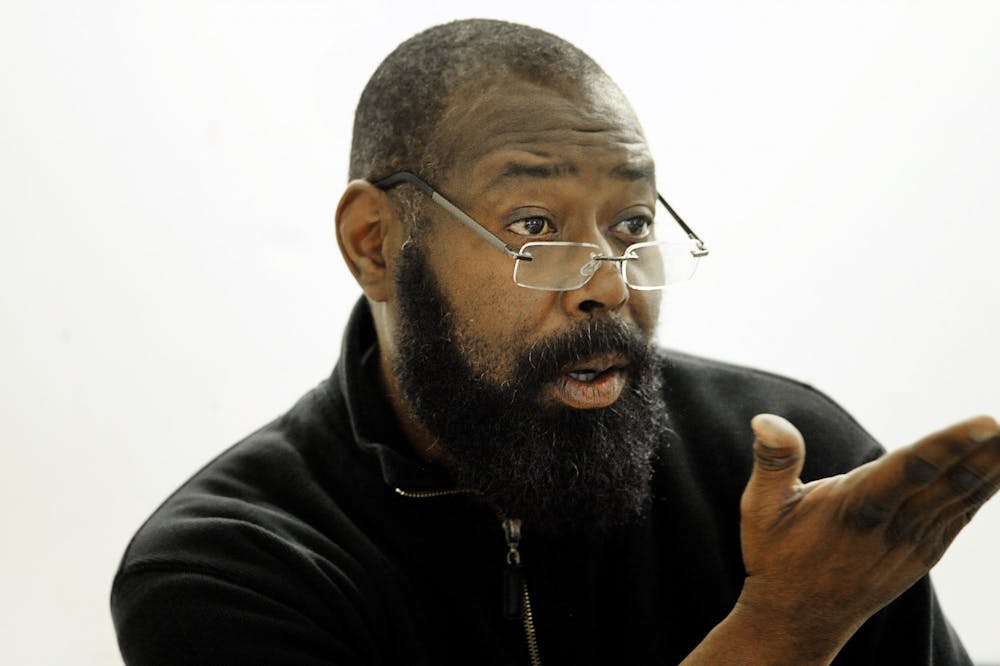“It was easy to see that work ethic that went along with his considerable imagination,” Simpson said. “It was very easy to see it early on.”
After Simpson became the director of the creative writing program in 2002, he hired Kenan.
Simpson said that Kenan threw himself into the program and quickly became an integral part of the creative writing department and beloved on campus.
“I don’t think he had any non-friends,” Simpson said. “This is a beloved man, and not just thought well of, respected. Absolutely beloved.”
Before he returned to UNC in 2003, Kenan taught at many institutions including Sarah Lawrence College, Columbia University, Duke University and the University of Mississippi.
Gabrielle Calvocoressi, an associate professor of creative writing at UNC, said she was in awe of Kenan when she was an undergraduate at Sarah Lawrence. She recalled the very first time she saw him, walking across the campus.
A queer person herself, Calvocoressi said Kenan was an icon and a bright spot in an otherwise dark period during the AIDS crisis in New York.
“To see Randall as this young, vibrant, extraordinary Black writer and this Black gay man, I think for all of us was tremendously important,” Calvocoressi said.
At UNC, Calvocoressi became office neighbors and friends with Kenan, one of her heroes. She said they would often make jokes between their adjacent offices and go to the movies together.
“He was just everything,” Calvocoressi said. “He was everything.”
Beyond his writing career, Kenan was known for his mentorship and genuine kindness toward everyone.
Calvocoressi said that there were always students in his office. Inside they would hear his music playing and have access to the candy bowl on his desk. She said that watching him taught her what her responsibility was as a teacher.
To get the day's news and headlines in your inbox each morning, sign up for our email newsletters.
“There were always students of color in that office, there were always gay students in that office,” Calvocoressi said. “Randall mirrored for me the idea that my responsibility went far beyond the classroom, particularly as an LGBTQ member of this faculty, my responsibility was to have my door open. Yes, it was about creative writing, but it was also about saying I see you and you’re here and my door is open to you.”
Savannah Bradley, a former student of Kenan’s, expressed her appreciation for him as a teacher and friend.
“I had the supreme luck of knowing him as a student, as a mentee, and as a friend,” Bradley said. “I think he had this ability to see us for who we were and teach those people. He stood out among professors in his ability to engage with and include students and just exhilarating discussions. He taught us to forevermore engage with art and each other.”
Bradley said that, above all, he was kind.
“I think he possessed this kind of unparalleled, cosmic kindness,” Bradley said. “Kindness was just the mode in which Kenan occupied the world, that’s just how he was.”
Ashlyn Beach, another former student, said he was always interested in students’ writing.
“Something that I really admired about him was that every story that he read, he was interested in making it better,” Beach said. “You know, it never felt like he was going through the motions. He always seemed genuinely invested in your story.”
Kenan was a vital part of the creative writing community and had participated in many writers’ conferences, including the Sewanee Writers’ Conference. The conference hosted a virtual memorial reading for Kenan on Sept. 21.
Jericho Brown, the director of the creative writing program at Emory University, was one of the readers who honored Kenan at the virtual memorial. Brown admired Kenan’s work even before he came to know him.
“I felt in so many ways that he was writing my life,” Brown said at the reading. “He was a queer, Black writer, writing the South and its flora and fauna and its ways of being, and I felt so called out and known in his work.”
Brown said once he came to know Kenan, he was able to learn a lot from him.
“I learned from Randall in a very special, one-on-one way,” Brown said at the reading.
The department of English and comparative literature is hosting a virtual memorial honoring Kenan on Oct. 21 at 5 p.m., and has set up the Randall Kenan Memorial Fund. The fund will help bring fellow writers to UNC — which was one of Kenan's passions.
In August, before his death, Kenan published a letter entitled “Letter from North Carolina: Learning from Ghosts of the Civil War," reflecting on his experiences as a Black man at UNC in the '80s and what is happening today on UNC’s campus and across the country.
“Today is impossible,” he wrote. “The convergence of Donald J. Trump, the coronavirus pandemic, the unrest over police abuse and the tumbling of Confederate monuments were all unimaginable decades back. Can we seize the moment? We all must now readjust our thinking. The war has only just begun.”
university@dailytarheel.com




